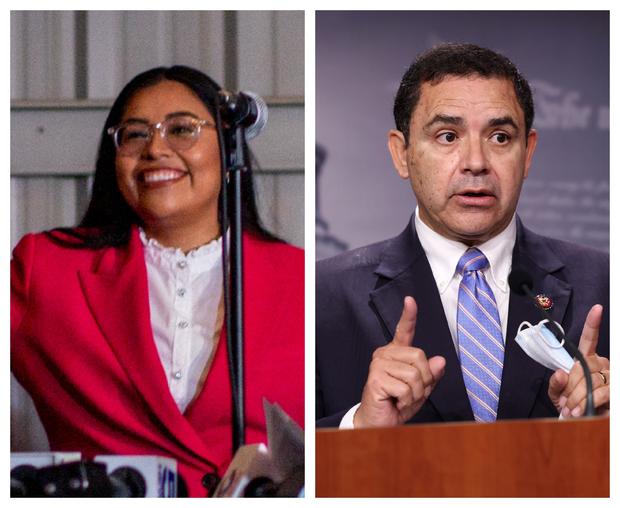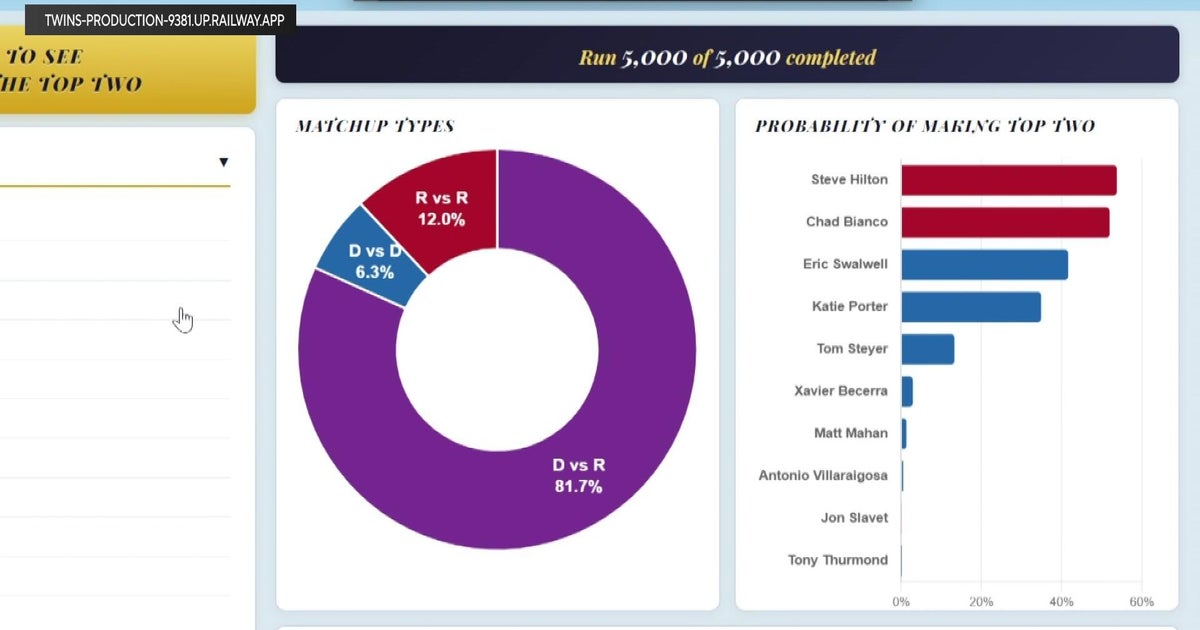One Democrat in the House doesn't support abortion rights. He faces a progressive challenger Tuesday.
Rep. Henry Cuellar of Texas is the lone anti-abortion Democrat left in the U.S House of Representatives. He has survived challenges from the left over the years because of his strong ties to his border district, and his appeal among constituents who share his more moderate approach. But with the Supreme Court now poised to overturn Roe v. Wade, progressives feel they have their best chance yet to defeat him.
Voters in the south Texas district will head to the polls Tuesday to choose between Cuellar and his liberal challenger, Jessica Cisneros. The contest is a runoff after neither candidate broke the 50% threshold needed to win outright in March. The race figures to test the strength of the abortion rights movement among more conservative Latino voters.
Cuellar, who was the only House Democrat to vote against the Women's Health Protection Act, maintains support from party leadership, despite calls from Cisneros to pull their support. Days after the draft Roe decision leaked, House Majority Whip Jim Clyburn of South Carolina went to Texas to campaign with Cuellar.
"I do not agree with Henry Cuellar on everything," Clyburn said, referring to Cuellar's stance on abortion. "We need to sit down with people who we do not agree with and try to find common ground, to do what is necessary to move this country forward."
But Cisneros has brought out some progressive supporters as well: Sen. Bernie Sanders came to San Antonio to campaign for her on Friday, and Rep. Alexandria Ocasio-Cortez came before the primary.
"If you believe, as the vast majority of American people do, that it is women who should control their bodies and not the government, then this election is very important," Sanders told CBS San Antonio affiliate KENS 5 before the rally with Cisneros.
South Texas has been a longtime haven for Democrats, but it's one of the areas with a major Latino population that has seen Republicans gain significant ground in recent years. That trend seems to be helping Cuellar's electability pitch in the primary, ahead of what is expected to be a dismal midterm year for Democrats. He led with 48.4% in the March primary, while Cisneros received 46.9%.
Cisneros and her supporters see the news over abortion as something to change the dynamic in the race.
"On May 24th, we will defeat the last anti-choice Democrat and South Texas will finally have a representative in their corner that will fight for their health care and freedom," she said in a statement on May 4.
A recent CBS News poll, following the leaked draft opinion, found that 72% of Hispanic voters want to see Roe kept as is, which is slightly above 64% of Americans who want the landmark decision left alone.
If Roe is overturned, 38% of Hispanic voters said they want abortion to be legal in all cases, while 29% said they want it to be legal in most cases, according to that same poll. Thirty-three percent said they would prefer that abortion be illegal in most (21%) or all (12%) cases. White voters were less likely to support legal abortion (61% combined between legal in all or most cases), while Black voters (77%) were more likely to support that.
Republicans, though, believe the issue could work in their favor. A recent internal poll by the Republican National Committee showed a similar number of Hispanic voters against abortion without restrictions.
Sylvia Bruni is a Democratic county chair for Webb County, a Cuellar stronghold and a predominantly Latino area. She said while the majority of the county's older, more religious Latino voters are against abortion, she's seen public opinion change in recent years and more progressive, pro-choice groups become more vocal and active since the draft opinion leak.
She added that there is not a clear cut line between Latinos on where they side on abortion now, as older voters have joined alongside younger groups leading protests against the Supreme Court's impending decisions.
"I've got a bunch of Democrats that are older, just like I am. And they're very much concerned over Roe v. Wade. We're all Catholic, but just like me, I'm very much personally against it. But I don't have the right to tell you what to do. Punto," she said.
Bruni said while the energy over the issue resides with progressives, which could help Cisneros, she couldn't predict if conservatives would also be energized by the prospect of overturning Roe.
After the leak, Cuellar put out a statement that reiterated his anti-abortion rights stance but also said he was against overturning Roe v. Wade.
"I do not support abortion, however, we cannot have an outright ban," he wrote, adding that there should be exceptions such as rape, incest and danger to the life of the mother. "My faith will not allow me to support a ruling that would criminalize teenage victims of rape and incest — my faith is clear: abortion must be rare & safe."
Neither Cisneros nor Cuellar agreed to be interviewed for this article.
Yvonne Gutierrez, the managing director of Latino Victory, said it's telling that Cuellar hasn't leaned into his anti-abortion stance during the runoffs. If Cisneros goes on to win on Tuesday, she believes their differences on the issue could be the deciding factor.
"We need to give Latino voters more credit, they really do understand what's at stake," Gutierrez said. She noted that while some Latinos don't personally support abortion, they are able to put "their personal beliefs aside for what this means for their communities and their rights."
The messaging from Gutierrez's group among Latino voters focuses in part on the disproportionate impact the overturning of Roe could have among people of color.
"We know the vast majority of Latinas are employed, many are head of households, mothers already, and when you think about the impact already, with the economy as it is, everyone is working hard to put food on the table, support their families with higher cost of living," she said. "When you look at these barriers at accessing care, they multiply."
Leah Greenberg, co-executive director of the progressive Indivisible Group, said Cuellar was "hedging" with his statement and noted an ad by "Mainstream Democrats," a PAC funded by LinkedIn cofounder and billionaire Reid Hoffman, that highlights how Cuellar "opposes a ban on abortion."
"That really speaks volumes about who perceives this issue to be a vulnerability for them," Greenberg said. "A lot of people may feel nuanced about abortion while being concerned about and opposed to extremist bans that fully take the choice out of the hands of actually concerned people."
"While there are often folks who may have mixed personal opinions on abortion, the overall popularity of the extremism that the GOP is advancing is clearly not [high]," she added.
Eileen Diaz McConnell, a sociologist and demographer at Arizona State University, said the nuance in how the Latino attitudes toward community feels about abortion is similar to the diversity of opinions among non-Hispanic White Americans. She said it often depends on factors like their gender, religious identity or how many generations they've been in the country, but that generally, a majority of Latinos support abortion in most or all cases.
"I don't know that we know enough to say, if we did apples — apples, White women — do they think exactly like Mexican women or Puerto Rican women or Cuban women?" she said. "So, I think they look somewhat similar, because in the aggregate [of Latino voter data], it's getting rid of all that internal diversity. Of which there is quite a bit."






